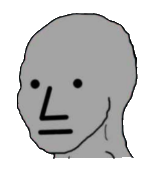|
There's a helpful youtube guide to parasocial relationships here which made a few things I had been thinking about in general about internet groups and relationships click.
|
|
|
|

|
| # ? Apr 27, 2024 15:33 |
|
So here is a question I have had for a while. It is an open question, and involves digging into D&D posters personal stories, which they don't seem to like to share. I went to tell my own story, and see how it compares with others'. What age did you start consuming "alternative media", realizing there were different media perspectives, or getting a critical view of the media? Did critical perspectives of the media develop over a long time, or was there an epiphany that the "mainstream media" might not be totally accurate? My own story is: I started reading the newspaper, I think for the comics section, when I was 7 or so. By the time I was 9, I would read the newspaper closely, kind of out of the obsessive desire to follow certain columns and features, rather than having a lot of comprehension of the stories. Around the same time, I would often read the alternative newsweekly, the "Willamette Week", which was a pretty standard alt-weekly newspaper that covered arts and current events. (Pretty much every city had one of those in the 1980s/1990s, right? It was pretty standard stuff, but for a 10 year old used to reading the sports section of the Oregonian, it probably seemed slightly weird. I remember around the same time, (or a few years later, I remember reading about Somalia in it, which would have been in 1992, when I was 13) my father having issues of Z Magazine, which was a more clearly politically leftist thing, and which of course was a gigantic difference from what I read in the Oregonian. So at the time, even though I still only had a hazy idea of what was going on in the world around me, I had some idea that there were alternate viewpoints. Placing them wasn't easy, but I knew the difference. Around the same time, probably around the age of 13, I remember reading some type of alternative magazine that my mother bought in an alternative bookstore, or maybe something for free, like low production values, maybe photocopied. I remember reading the back and it had a vocabulary list, and one of them was "Public Education = A Welfare System for Liberal Arts Majors". Sick burn, that! It also had a cartoon showing an inquisitive young person asking his father questions, but the father was brainwashed by the television to only care about sports, and was repeating "Go Blazers". I think the magazine or newsletter was written from a Libertarian standpoint. I don't know why I fixed this in my memory, besides it might have been my first experience that not only was there alternative media, but that some of it had its own agenda that I didn't agree with. A few years later, I was 15-17, living in Portland, Oregon. This was the mid-1990s, and for technical reasons (computers made desktop publishing easuer), as well as cultural reasons (the grunge years, openness to LGBT and different subcultures, etc), there was a flood of alternative media. I remember one newspaper, PDXS, which was launched to compete with the Willamette Week, mostly attacking it for being too mainstream. And of course, in the mid-1990s, and being a teenager, I always wanted to prove how against the mainstream I was, but then I noticed before too long that it started having more improbable stuff in it, like conspiracy theories about the Clintons. Whether that was for ideological reasons, or because they wanted to build up their fringe credibility, I don't know. But I do remember being wary of it. So basically, by the time I was 18, I had been introduced to different forms and viewpoints in the media, and had already realized that some of those viewpoints were also suspect. I still read them, even if only out of boredom (lots of free newspapers available for long bus rides in Portland), and I kind of mentally compartmentalized what I was reading, and what its purpose was. I hope that wasn't too much detail, but I think it is a good question: when and how did you start to realize there was multiple perspectives, and to evaluate them for trustworthiness? For me, it really did build up basically since I was a kid, with no single "ah-ha" moment.
|
|
|
|
Was reading through this quietly when I thought of something I thought might be interesting to add. Discendo Vox came up with a concept they didn't describe in much detail which was 'disrupting cognition'. And this made me think of a concept with an ACTUAL definition, Affective Override. Which is a term from a book ABOUT propoganda(that I have not read to be honest so I can't REALLY debate the veracity of its arguments, just the possible use of the term) called How PRopoganda Works by Jason Stanley which is when your emotions override your critical analysis. I heard about the term from this here youtube video: https://www.youtube.com/watch?v=5Luu1Beb8ng If we want to boil propaganda down to 'information meant on some level to manipulate someone', then it feels almost pointless as a TOOL except as a way to get your foot in the door about further philosophical arguments not having to do with Media itself. devilmaydry fucked around with this message at 05:02 on Feb 19, 2019 |
|
|
|
I don't really know where else to post this but I had like an hour-long conversation with my SO over the weekend trying to convince her that Jeremy Corbyn wasn't an anti-semite or the "Trump of the UK". She's not stupid nor conservative, and at least leans left even if she's turned off by hyper partisan poo poo and avoids it if she can. She told me this was basically how NPR and BBC world service are covering him 24/7 and without digging deeper it basically gives the impression that Corbyn is the Trump to May's Clinton. I wanted to just start playing the recent Chapo ep about the character assassination of leftists by the mainstream but that's not how real humans interact so I was just kinda stuck going "he didn't say that" or "that's not a thing that happened". I expect this kind of poo poo out of right-wing news but didn't expect something so milquetoast to be rolling so hard for this narrative.
|
|
|
|
Anything that resembles even the smallest real threat to the status quo will get the Corbyn treatment in the media. Antisemite, nazi, conspiracy theory are all used constantly to discredit people. Antisemitism is the nuclear option though. And even if nothing is based on facts if you repeat it over and over again something will stick.
|
|
|
|
NPR and BBC are right-wing media.
|
|
|
|
For example, BBC's Question Time show just got caught planting Tory activists in the audience and "just happening" to let them ask the questions: https://twitter.com/OwenJones84/status/1104767159329308678
|
|
|
|
Deified Data posted:I don't really know where else to post this but I had like an hour-long conversation with my SO over the weekend trying to convince her that Jeremy Corbyn wasn't an anti-semite or the "Trump of the UK". Labour does have an anti-semitism problem, though. A couple of MP's split over it and a bunch of Corbynites are calling anyone mentioning antisemitism zionists, even Jewdas. It's not some kind of media invention. Here, from the IoSM thread: TinTower posted:Sarah herself isn't the IOSM; the IOSM is in the attached screenshot. TinTower posted:
TinTower posted:I mean, it already happened to Jon Lansman and Rhea Wolfsson. It was only a matter of time before they went for Jewdas.
|
|
|
|
Absurd Alhazred posted:Labour does have an anti-semitism problem, though. A couple of MP's split over it and a bunch of Corbynites are calling anyone mentioning antisemitism zionists, even Jewdas. It's not some kind of media invention. Here, from the IoSM thread: but are any of these people actually high up in labor, or are they just facebook randos who happen to support labor? the only result i found for katie nikiforou is the quote below. devon nola's only mention is appearing on a list of self-hating jews, where he is listed without any affiliations. asa winstanley is a freelance reporter. as far as i can tell, none of these people are involved in the labor party apparatus. quote:"No, as I have a poster against swine flu in my front window and have mental illness history, does that mean I will be sectioned again? And worse still forced to get vaccinated. Freedom it appears is the main casualty of what would appear to be a flu even milder than normal flu! I think they should give up there are so many people who know swine flu scaremongering is a hoax and so many are suspicious of the vaccine, we should hold a demo against it!" – Katie Nikiforou, Buckinghamshire
|
|
|
|
Came to say amazing thread.glowing-fish posted:So here is a question I have had for a while. It is an open question, and involves digging into D&D posters personal stories, which they don't seem to like to share. I went to tell my own story, and see how it compares with others'. Are you still in Santiago? This would be great bar talk.
|
|
|
|
GoluboiOgon posted:but are any of these people actually high up in labor, or are they just facebook randos who happen to support labor? That's the thing, I have no problem saying there are antisemites in...virtually any political organization worldwide, whether I agree with them or not. The problem I have is with the wording, "Labour has an antisemitism problem" - do they? Are they infested with antisemites, do antisemites steer policy or hold office? It just reads like "Democrats have an antisemitism problem" in the US, clearly disingenuous.
|
|
|
|
wateroverfire posted:Came to say amazing thread. Yes, I am. Will be for at least a while longer. Today, I walked from Melipilla to El Paico. Which, if we were in the United States, Melipilla would have its own newspaper, and for that matter, El Paico might too, although the El Paico newspaper would be a legacy product that mostly printed coupons and reprints of obvious news items and little essays by the publisher, who inherited the newspaper from his father.
|
|
|
|
glowing-fish posted:Yes, I am. Will be for at least a while longer. That is a hell of a walk, dude. Do you still have PMs? A cluster analysis of the effects of ownership concentration on Chilean media, which is something I never expected to be studied but in fact was. wateroverfire fucked around with this message at 13:25 on Mar 14, 2019 |
|
|
|
Here's a fun bit of media framing for you. Headline:  The implication of that headline is that O'Rourke really destroyed whatever record Sanders set. Reality:  He beat Sanders' total by 3%, and Sanders' total was four times the third-placed candidate. That information comes ten paragraphs into a twelve-paragraph article, so most people won't get that far, they'll just see "O'Rourke smashed Sanders' record, that means O'Rourke is the clear frontrunner, the end." Source: https://www.theguardian.com/us-news/2019/mar/18/beto-orourke-2020-campaign-fundraising-first-24-hours
|
|
|
|
This seems like a really roundabout and overly verbose way of just saying that you think alternative media is generally worse and less credible than mainstream media. While it's true that some alternative media is obviously dumb (which isn't that surprising, considering the label "alternative media" applies to literally all non-mainstream media), the judgement of anyone who directs more negative attention towards it than mainstream media is highly suspect, because mainstream media (pretty much by definition) is far more influential and relevant, and generally reflects the perspective of those with wealth and power. When the mainstream media supports false or harmful things, there are dramatically more harmful and extensive consequences than a random local alt weekly publishing something dumb. There's also a cultural element where (also partly by definition of being "mainstream") mainstream media "feels" more reasonable and "serious" in its general presentation. When WaPo or NPR give false or misleading information, their reputation and tone lead to a perception of "well no one's perfect, sometimes mistakes are made" (if people even acknowledge the issue in the first place), while the same thing in alt media (or foreign media in a non-US-aligned country) would be viewed as completely discrediting the organization in question. It's not exactly hard to show that US media has frequently behaved in a way that directly reflects the interests of the US government, but people still have a gut feeling that it's weird, if not outright ludicrous, to consider it propaganda in the same way they might consider foreign media. Higher production values also lead people to be more forgiving of lies and falsehoods than they would be of the same information coming from a cheaply produced local paper.
|
|
|
|

|
| # ? Apr 27, 2024 15:33 |
|
Ytlaya posted:This seems like a really roundabout and overly verbose way of just saying that you think alternative media is generally worse and less credible than mainstream media. I think that my four or so paragraph post is of an appropriate length for discussing a complicated subject. Perhaps introspection and personal history are not things you want to discuss? I didn't want to go too far into that, but I thought it was an interesting and relevant subject. In any case, I am kind of wondering how you got this: quote:you think alternative media is generally worse and less credible than mainstream media. Out of this: quote:I had been introduced to different forms and viewpoints in the media, and had already realized that some of those viewpoints were also suspect. Specifically, the viewpoints that I was thinking of as lacking credibility were right-wing or libertarian viewpoints, and not magazines like Z Magazine. I don't consider magazines like Z Magazine, or The New Republic, or The Nation, or Mother Jones, to be non-mainstream, really. They are mainstream magazines with a certain political viewpoint. I also don't consider arts or city weeklies to be non-mainstream. When I was talking about non-mainstream, I was more talking about things along the lines of zines talking about how Aspartame causes AIDS, or Lyndon LaRouche explaining how Kepler's mathematics of planetary motion mean that the United States should be a federalist, fusion-based society.
|
|
|




















